Students’ Essays on Infectious Disease Prevention, COVID-19 Published Nationwide
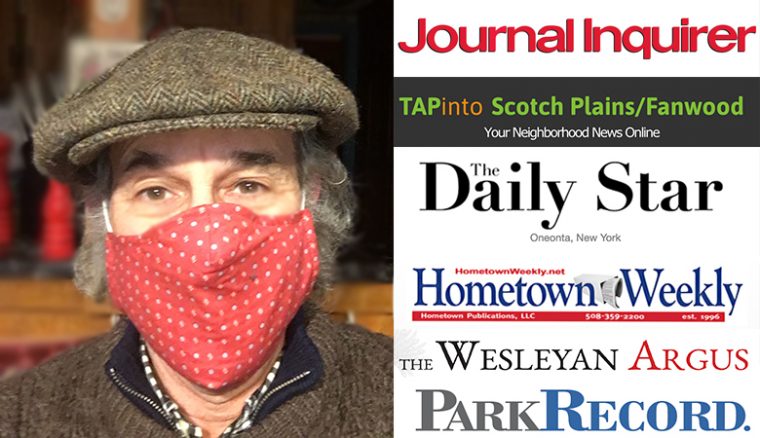
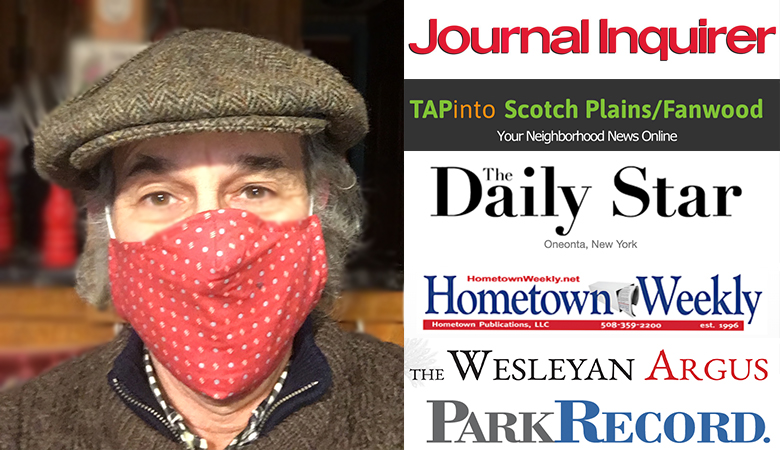
As part of the BIO 173: Global Change and Infectious Disease course, Professor Fred Cohan assigns students to write an essay persuading others to prevent future and mitigate present infectious diseases. If students submit their essay to a news outlet—and it’s published—Cohan awards them with extra credit.
As a result of this assignment, more than 25 students have had their work published in newspapers across the United States. Many of these essays cite and applaud the University’s Keep Wes Safe campaign and its COVID-19 testing protocols.
Cohan, professor of biology and Huffington Foundation Professor in the College of the Environment (COE), began teaching the Global Change and Infectious Disease course in 2009, when the COE was established. “I wanted very much to contribute a course to what I saw as a real game-changer in Wesleyan’s interest in the environment. The course is about all the ways that human demands on the environment have brought us infectious diseases, over past millennia and in the present, and why our environmental disturbances will continue to bring us infections into the future.”
Over the years, Cohan learned that he can sustainably teach about 170 students every year without running out of interested students. This fall, he had 207. Although he didn’t change the overall structure of his course to accommodate COVID-19 topics, he did add material on the current pandemic to various sections of the course.
“I wouldn’t say that the population of the class increased tremendously as a result of COVID-19, but I think the enthusiasm of the students for the material has increased substantially,” he said.
To accommodate online learning, Cohan shaved off 15 minutes from his normal 80-minute lectures to allow for discussion sections, led by Cohan and teaching assistants. “While the lectures mostly dealt with biology, the discussions focused on how changes in behavior and policy can solve the infectious disease problems brought by human disturbance of the environment,” he said.
Based on student responses to an introspective exam question, Cohan learned that many students enjoyed a new hope that we could each contribute to fighting infectious disease. “They discovered that the solution to infectious disease is not entirely a waiting game for the right technologies to come along,” he said. “Many enjoyed learning about fighting infectious disease from a moral and social perspective. And especially, the students enjoyed learning about the ‘socialism of the microbe,’ how preventing and curing others’ infections will prevent others’ infections from becoming our own. The students enjoyed seeing how this idea can drive both domestic and international health policies.”
A sampling of the published student essays are below:
Alexander Giummo ’22 and Mike Dunderdale’s ’23 op-ed titled “A National Testing Proposal: Let’s Fight Back Against COVID-19” was published in the Journal Inquirer in Manchester, Conn.
They wrote: “With an expansive and increased testing plan for U.S. citizens, those who are COVID-positive could limit the number of contacts they have, and this would also help to enable more effective contact tracing. Testing could also allow for the return of some ‘normal’ events, such as small social gatherings, sports, and in-person class and work schedules.
“We propose a national testing strategy in line with the one that has kept Wesleyan students safe this year. The plan would require a strong push by the federal government to fund the initiative, but it is vital to successful containment of the virus.
“Twice a week, all people living in the U.S. should report to a local testing site staffed with professionals where the anterior nasal swab Polymerase Chain Reaction (PCR) test, used by Wesleyan and supported by the Broad Institute, would be implemented.”
Kalyani Mohan ’22 and Kalli Jackson ’22 penned an essay titled “Where Public Health Meets Politics: COVID-19 in the United States,” which was published in Wesleyan’s Arcadia Political Review.
They wrote: “While the U.S. would certainly benefit from a strengthened pandemic response team and structural changes to public health systems, that alone isn’t enough, as American society is immensely stratified, socially and culturally. The politicization of the COVID-19 pandemic shows that individualism, libertarianism and capitalism are deeply ingrained in American culture, to the extent that Americans often blind to the fact community welfare can be equivalent to personal welfare. Pandemics are multifaceted, and preventing them requires not just a cultural shift but an emotional one amongst the American people, one guided by empathy—towards other people, different communities and the planet. Politics should be a tool, not a weapon against its people.”
Sydnee Goyer ’21 and Marcel Thompson’s ’22 essay “This Flu Season Will Be Decisive in the Fight Against COVID-19” also was published in Arcadia Political Review.
“With winter approaching all around the Northern Hemisphere, people are preparing for what has already been named a “twindemic,” meaning the joint threat of the coronavirus and the seasonal flu,” they wrote. “While it is known that seasonal vaccinations reduce the risk of getting the flu by up to 60% and also reduce the severity of the illness after the contamination, additional research has been conducted in order to know whether or not flu shots could reduce the risk of people getting COVID-19. In addition to the flu shot, it is essential that people remain vigilant in maintaining proper social distancing, washing your hands thoroughly, and continuing to wear masks in public spaces.”
An op-ed titled “The Pandemic Has Shown Us How Workplace Culture Needs to Change,” written by Adam Hickey ’22 and George Fuss ’21, was published in Park City, Utah’s The Park Record.
They wrote: “One review of academic surveys (most of which were conducted in the United States) conducted in 2019 found that between 35% and 97% of respondents in those surveys reported having attended work while they were ill, often because of workplace culture or policy which generated pressure to do so. Choosing to ignore sickness and return to the workplace while one is ill puts colleagues at risk, regardless of the perceived severity of your own illness; COVID-19 is an overbearing reminder that a disease that may cause mild, even cold-like symptoms for some can still carry fatal consequences for others.
“A mandatory paid sick leave policy for every worker, ideally across the globe, would allow essential workers to return to work when necessary while still providing enough wiggle room for economically impoverished employees to take time off without going broke if they believe they’ve contracted an illness so as not to infect the rest of their workplace and the public at large.”
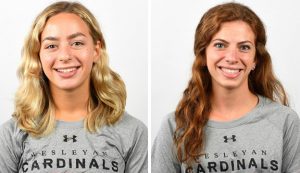
Women’s cross country team members and classmates Jane Hollander ’23 and Sara Greene ’23 wrote a sports-themed essay titled “This Season, High School Winter Sports Aren’t Worth the Risk,” which was published in Tap into Scotch Plains/Fanwood, based in Scotch Plains, N.J. Their essay focused on the risks high school sports pose on student-athletes, their families, and the greater community.
“We don’t propose cutting off sports entirely— rather, we need to be realistic about the levels at which athletes should be participating. There are ways to make practices safer,” they wrote. “At [Wesleyan], we began the season in ‘cohorts,’ so the amount of people exposed to one another would be smaller. For non-contact sports, social distancing can be easily implemented, and for others, teams can focus on drills, strength and conditioning workouts, and skill-building exercises. Racing sports such as swim and track can compete virtually, comparing times with other schools, and team sports can focus their competition on intra-team scrimmages. These changes can allow for the continuation of a sense of normalcy and team camaraderie without the exposure to students from different geographic areas in confined, indoor spaces.”
Brook Guiffre ’23 and Maddie Clarke’s ’22 op-ed titled “On the Pandemic” was published in Hometown Weekly, based in Medfield, Mass.
“The first case of COVID-19 in the United States was recorded on January 20th, 2020. For the next month and a half, the U.S. continued operating normally, while many other countries began their lockdown,” they wrote. “One month later, on February 29th, 2020, the federal government approved a national testing program, but it was too little too late. The U.S. was already in pandemic mode, and completely unprepared. Frontline workers lacked access to N-95 masks, infected patients struggled to get tested, and national leaders informed the public that COVID-19 was nothing more than the common flu. Ultimately, this unpreparedness led to thousands of avoidable deaths and long-term changes to daily life. With the risk of novel infectious diseases emerging in the future being high, it is imperative that the U.S. learn from its failure and better prepare for future pandemics now. By strengthening our public health response and re-establishing government organizations specialized in disease control, we have the ability to prevent more years spent masked and six feet apart.”
In addition, their other essay, “On Mass Extinction,” was also published by Hometown Weekly.
“The sixth mass extinction—which scientists have coined as the Holocene Extinction—is upon us. According to the United Nations, around one million plant and animal species are currently in danger of extinction, and many more within the next decade. While other extinctions have occurred in Earth’s history, none have occurred at such a rapid rate,” they wrote. “For the sake of both biodiversity and infectious diseases, it is in our best interest to stop pushing this Holocene Extinction further.”
An essay titled “Learning from Our Mistakes: How to Protect Ourselves and Our Communities from Diseases,” written by Nicole Veru ’21 and Zoe Darmon ’21, was published in My Hometown Bronxville, based in Bronxville, N.Y.
“We can protect ourselves and others from future infectious diseases by ensuring that we are vaccinated,” they wrote. “Vaccines have high levels of success if enough people get them. Due to vaccines, society is no longer ravaged by childhood diseases such as mumps, rubella, measles, and smallpox. We have been able to eradicate diseases through vaccines; smallpox, one of the world’s most consequential diseases, was eradicated from the world in the 1970s.
“In 2000, the U.S. was nearly free of measles, yet, due to hesitations by anti-vaxxers, there continues to be cases. From 2000–2015 there were over 18 measles outbreaks in the U.S. This is because unless a disease is completely eradicated, there will be a new generation susceptible.
“Although vaccines are not 100% effective at preventing infection, if we continue to get vaccinated, we protect ourselves and those around us. If enough people are vaccinated, societies can develop herd immunity. The amount of people vaccinated to obtain herd immunity depends on the disease, but if this fraction is obtained, the spread of disease is contained. Through herd immunity, we protect those who may not be able to get vaccinated, such as people who are immunocompromised and the tiny portion of people for whom the vaccine is not effective.”
Dhruvi Rana ’22 and Bryce Gillis ’22 co-authored an op-ed titled “We Must Educate Those Who Remain Skeptical of the Dangers of COVID-19,” which was published in Rhode Island Central.
“As Rhode Island enters the winter season, temperatures are beginning to drop and many studies have demonstrated that colder weather and lower humidity are correlated with higher transmissibility of SARS-CoV-2, the virus that causes COVID-19,” they wrote. “By simply talking or breathing, we release respiratory droplets and aerosols (tiny fluid particles which could carry the coronavirus pathogen), which can remain in the air for minutes to hours.
“In order to establish herd immunity in the US, we must educate those who remain skeptical of the dangers of COVID-19. Whether community-driven or state-funded, educational campaigns are needed to ensure that everyone fully comprehends how severe COVID-19 is and the significance of airborne transmission. While we await a vaccine, it is necessary now more than ever that we social distance, avoid crowds, and wear masks, given that colder temperatures will likely yield increased transmission of the virus.”
Danielle Rinaldi ’21 and Verónica Matos Socorro ’21 published their op-ed titled “Community Forum: How Mask-Wearing Demands a Cultural Reset” in the Ewing Observer, based in Lawrence, N.J.
“In their own attempt to change personal behavior during the pandemic, Wesleyan University has mandated mask-wearing in almost every facet of campus life,” they wrote. “As members of our community, we must recognize that mask-wearing is something we are all responsible and accountable for, not only because it is a form of protection for us, but just as important for others as well. However, it seems as though both Covid fatigue and complacency are dominating the mindsets of Americans, leading to even more unwillingness to mask up. Ultimately, it is inevitable that this pandemic will not be the last in our lifespan due to global warming creating irreversible losses in biodiversity. As a result, it is imperative that we adopt the norm of mask-wearing now and undergo a culture shift of the abandonment of an individualistic mindset, and instead, create a society that prioritizes taking care of others for the benefit of all.”
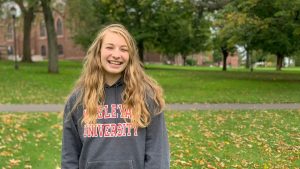
Shayna Dollinger ’22 and Hayley Lipson ’21 wrote an essay titled “My Pandemic Year in College Has Brought Pride and Purpose.” Dollinger submitted the piece, rewritten in first person, to Jewish News of Northern California. Read more about Dollinger’s publication in this News @ Wesleyan article.
“I lay in the dead grass, a 6-by-6-foot square all to myself. I cheer for my best friend, who is on the stage constructed at the bottom of Foss hill, dancing with her Bollywood dance group. Masks cover their ordinarily smiling faces as their bodies move in sync. Looking around at friends and classmates, each in their own 6-by-6 world, I feel an overwhelming sense of normalcy.
“One of the ways in which Wesleyan has prevented outbreaks on campus is by holding safe, socially distanced events that students want to attend. By giving us places to be and things to do on the weekends, we are discouraged from breaking rules and causing outbreaks at ‘super-spreader’ events.”
An op-ed written by Luna Mac-Williams ’22 and Daëlle Coriolan ’24 titled “Collectivist Practices to Combat COVID-19” was published in the Wesleyan Argus.
“We are embroiled in a global pandemic that disproportionately affects poor communities of color, and in the midst of a higher cultural consciousness of systemic inequities,” they wrote. “A cultural shift to center collectivist thought and action not only would prove helpful in disease prevention, but also belongs in conversation with the Black Lives Matter movement. Collectivist models of thinking effectively target the needs of vulnerable populations including the sick, the disenfranchised, the systematically marginalized. Collectivist systems provide care, decentering the capitalist, individualist system, and focusing on how communities can work to be self-sufficient and uplift our own neighbors.”
An essay written by Maria Noto ’21, titled “U.S. Individualism Has Deadly Consequences,” is published in the Oneonta Daily Star, based in Oneonta, N.Y.
She wrote, “When analyzing the cultures of certain East Asian countries, several differences stand out. For instance, when people are sick and during the cold and flu season, many East Asian cultures, including South Korea, use mask-wearing. What is considered a threat to freedom by some Americans is a preventive action and community obligation in this example. This, along with many other cultural differences, is insightful in understanding their ability to contain the virus.
“These differences are deeply seeded in the values of a culture. However, there is hope for the U.S. and other individualistic cultures in recognizing and adopting these community-centered approaches. Our mindset needs to be revolutionized with the help of federal and local assistance: mandating masks, passing another stimulus package, contact tracing, etc… However, these measures will be unsuccessful unless everyone participates for the good of a community.”
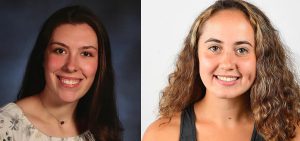
A published op-ed by Madison Szabo ’23, Caitlyn Ferrante ’23 ran in the Two Rivers Times. The piece is titled “Anxiety and Aspiration: Analyzing the Politicization of the Pandemic.”
John Lee ’21 and Taylor Goodman-Leong ’21 have published their op-ed titled “Reassessing the media’s approach to COVID-19” in Weekly Monday Cafe 24 (Page 2).
An essay by Eleanor Raab ’21 and Elizabeth Nefferdorf ’22 titled “Preventing the Next Epidemic” was published in The Almanac.

